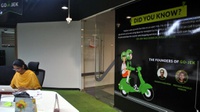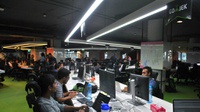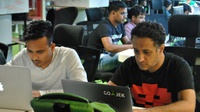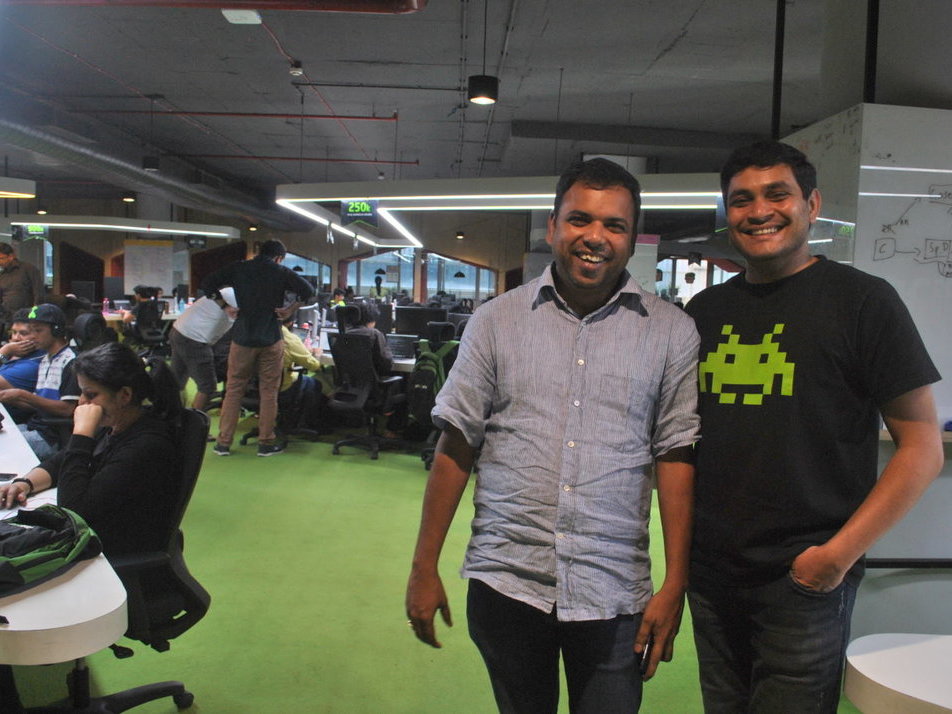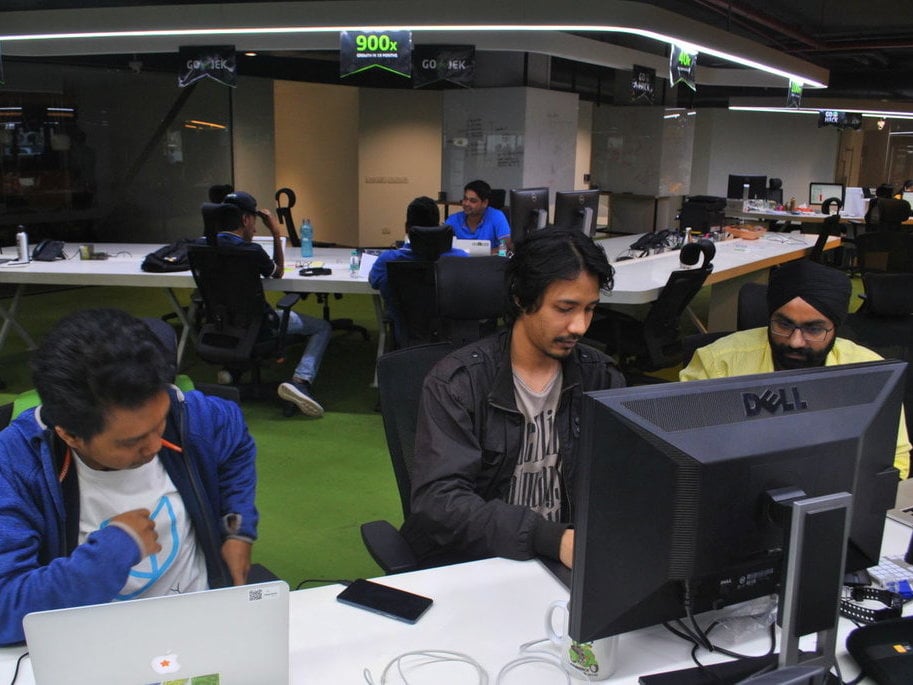tirto.id - Go-Jek’s office in India exudes the start-up vibe in every way. Set on the fourth floor of one of the gleaming black towers of Diamond District in a busy hub of Bengaluru, the office is somehow both laidback and buzzing. At the entrance is the Indonesian bike taxi app’s trademark green scooter – the ojek – and a couple of bright green helmets, like the ones Go-Jek scooter drivers wear. Inside, a vast hall carpeted green, darkened interiors, and about 60 young faces lit by their laptop screens. Large glass windows overlook Bengaluru’s rain clouds and heavy traffic jams. In the cosy sofas before the windows, some coders lounge with laptops, entirely still, with their fingers moving rapidly across the keyboard. A group of two Indians and one Indonesian runs across the hall towards a meeting room, animatedly discussing a point. In a balcony outside, a few employees smoke quietly, each lost in their own thoughts.
On the wall at the far end of the hall, is the enormous “Did You Know?” under which a brief pictorial history describes Go-Jek’s origins, its Jakarta-based founder Nadiem Makarim, and the app’s current status as Indonesia’s biggest consumer-internet company. Above nearly every desk, are proud statistics: 250 million drivers, 900x growth, 90x food delivery partners.
The most popular bike taxi service in Jakarta today, Go-Jek was the first South East Asian internet company to set up its development centre in India. It did so by acquiring Bengaluru-based C42 Engineering and Delhi-based CodeIgnition in April 2015. Go-Jek’s transaction volumes have since grown 900 times. It took nine months only, from January to October 2016, for the company to launch 19 new products. Initially focused on bike transport, courier, and shopping only, Go-Jek is now an internet platform from which Indonesians can order services ranging from beauty services (Go-Glam), massages (Go-Massage), house cleaning (Go-Clean), automobile service, up to online payment (Go-Pay).
See the Bahasa Indonesia version: Go-Jek, Karya Anak Bangsa Blasteran India
The idea to set up an office in India came into being in early April 2015, after the Indian engineering company C42 worked on consultancy with Go-Jek for two months in Jakarta to fix a software bug that once hit its mobile app. Ajey Gore, Group Chief Technical Officer, and former cofounder of CodeIgnition, says that the relationship was established through Sequoia Capital India, which backs Go-Jek.
“A few of us from C42 went to Jakarta to work on the consultancy, and at the time Go-Jek was working with three other companies too,” says Gore, sipping his coffee in a glass-walled meeting room decorated pink and green with strategy scribbles. “Each company’s approach was different, but Go-Jek recognised our philosophy of working as quite similar to its own. On our part, we immediately realised that as Go-Jek grew in scale, and offered more products, the technical challenges would get tougher and incredibly more interesting. That’s what hooked us.”
Gore’s statement is confirmed by Niranjan Paranjape, Go-Jek’s Chief Architect. “Initially, everyone involved, including Nadiem, underestimated the size of the market in Jakarta. After we fixed one bug in the app, and Go-Jek got more drivers and more customer orders, new bugs popped up. We fixed that, and it grew 20 times, 50 times, and again, more problems to solve. In two months, we were convinced about Go-Jek being a unique product, like nothing in Asia, except for China,” says Paranajape.
The reason to set up an office in Bengaluru, Gore describes, is to take the advantage of the start-up and tech experience in the Indian city. “This is not a capacity hire in any way,” says Gore. “Both Go-Jek and the Indian team decided that we wanted to do this together. The technical challenge was just so exciting. The partnership happened organically.”
Group Chief Technical Officer Ajey Gore (left) with Niranjan Paranjape (right), Go-Jek’s Chief Architect, in R&D office, downtown Bengaluru. ©April 2017 Rohini Mohan
Indonesia was at first little known by these Indian techies. But after a visit to the country, they were convinced of how “happy and friendly” the people were. Gore found reassuring similarities between India and Indonesia as well. “Even Jakarta’s traffic as bad as Bengaluru’s except there they are much more disciplined, and the vehicles are in a neat line in the jam!” he says.
Paranjape adds, “In India, the software developer or tech guy’s eye is usually on the US or Europe market. But those are saturated markets, I feel. Most people don’t know that Indonesia has half the population of India, triple its per capita GDP, and a huge smartphone penetration.” Both Gore and Paranjape observe that, in comparison to India, the start-up ecosystem in Indonesia is still at its early stages. For over a decade, the duo have themselves worked to distribute and develop open source software, and on technical back-end consulting. “The match was perfect: Go-Jek wanted to have real social and business impact, and we had the experience to unleash the platform’s full potential.”
In April 2015, Go-Jek looked for offices in Bengaluru, India’s tech city for over two decades now. “We only look at the busy, central areas of Bengaluru,” says Paranjape, laughing. He points out that most of the big software and technology firms were in the city’s suburbs, cut off from real life. “As a start-up, we wanted to be in the middle of the city’s life, parties, traffic, real urban, cosmopolitan pulse.”
The Bengaluru office is two years old now, but it seems to have deeply integrated into the Indonesian company. Gore says Go-Jek has now grown to more than 200 employees, equally distributed in Jakarta and Bengaluru. At any given point of time, he says there are at least 30 employees overseas. “Product features are driven by Indonesia and it may have a team in India to back them up,” says Gore. “On the other hand, India is working on the food service, and an Indonesian team flies down here to work with us. If we don’t do a cross proliferation across teams, we won’t be able to match progress to the scale at which Go-Jek is growing.”
Just outside the meeting room, in the food services team, is Baskara Nur Patria, who has moved to Bengaluru four weeks ago and will stay here for a year. Go-Jek is the 23-year-old’s first job—he joined in September 2015 immediately after graduated from ITS (Surabaya Institute of Technology) in Indonesia. “There is a difference in the work in Bengaluru and Indonesia,” says Baskara. “In Jakarta, I used to be slacking off!”
Gore, who’s sitting nearby, sputters on his coffee upon hearing that. “I’m trying to be honest!” says Baskara, laughing. “It’s true though. The difference is that the senior technical mentors, the main talent, are in India, and work is quite fast here. I can get my questions answered directly here.” Baskara says that he enjoys the lack of hierarchy, a start-up work culture that he believes is only now catching on in Jakarta. “For a fresh graduate, otherwise, these kind of challenges are difficult to find. You can learn a lot quite quickly.”
As we speak, Gore introduces Bimo, another Indonesian national whom he says wrote some of the first lines of codes that had created the Go-Jek app. With his shoulder-length hair, sprinkle beard, and casual jacket, Bimo is the epitome of the quintessential start-up look. Asked to elaborate his job, Bimo’s answer is modest. “What I do? I just make things work. I write codes.” Hired as a freelancer in Jakarta first, he witnesses how Go-Jek has developed from a call-in service with about 100 orders a day, to the app-based service that records around 10,000 orders a day. “We didn’t realise how big it will get once we made an app,” he says. “As the number of customers increased, more drivers were willing to join Go-Jek without much persuasion.”
When Bimo began with Go-Jek, there were 200-250 drivers, and his team planned to double the number by the end of the year. “But within two months of launching the app, we had already reached our annual target. We needed to scale up very fast, and that’s where this tie-up and expansion with Bengaluru helps.” As a senior coder at Go-Jek, Bimo used to fly between Jakarta and Bengaluru frequently. Recently married, he has now moved to Bengaluru with his wife.
“In Indonesia, the start-up system is still young. Most people work in big companies, and are used to that hierarchy and structure. The team in Indonesia and me… we are still adapting to the new style, the open, informal, creative start-up culture in Bengaluru. Personally, I like it. It doesn’t feel like an office.”
What he misses, though, is the immersive feel of how Go-Jek is used in Jakarta. “Back home, on the way to work, I used to count how many Go-Jeks I saw, or I used to chat with the drivers hanging around outside the office, or I used to use the app myself,” says Bimo. But since the Go-Jek app is not available for consumers in Bengaluru, he depends on more quantitative data to understand the field-level operations. “This is the only difference.”
Bimo (at the middle), a senior programmer from Indonesia, moves the the city and enjoys the open, easygoing, and creative corporate culture in Bengaluru. © April 2017 Rohini Mohan
Gore and Panranjape stays in Jakarta every two weeks, by rotation. Paranajape had just returned from Jakarta the previous night. He rubs his eyes, “It’s a lot of travel back and forth, because India is not a back office for Jakarta or the other way around. Nadeim Makareim decided to set up an office in Bangalore and have a fluid system so that we grow overall.” He admits a merger was riskier for Go-Jek than simply contracting someone to do the engineering—the need to be more proactive, to communicate across countries, to think from different points of view, and to adapt engineering design for a growing company. “But Nadeim understood the value of an experienced team,” says Paranjape.
“It’s very tiring, but we want to maintain a lot of communication between the countries,” says Gore. “I say the secret of this format working is extreme collaboration and communication.” Most teams, he says, work from both places. For instance, the food team, including Baskara, is in Bengaluru to work on some new services. They’ll stay for two months at least. On the other hand, “the pay team”—who handle Go-Pay—are ready to leave to Jakarta next month.
Ranjan Sakalley, the Vice President of Core Back End, has earlier worked with most of the co-founders in Bengaluru. He says a third of his day is spent in “talking to people in Jakarta on product features and bugs”, so that his team can respond in real time.
Go-Jek’s board now consists of eight people, four of whom are India nationals: Gore, Paranajape, India Managing Director Sidu Ponnappa and restaurant review firm Burrp’s former member Aakash Dharmadhikari as chief product officer.
“We’re hiring aggressively in both countries,” says Gore. “And we believe everyone needs to code or write stories or develop products. We don’t have managers to just manage.”
The recruitment is slow, he says, and intentionally so. “About 95 percent of our hires are through referrals, because that is foolproof hiring,” says Gore. At the moment, the product team has equal number of men and women, but female employment in engineering team is only 30 percent. “We are actively trying to change that.” They would offer a double incentive to someone to refers a woman coder. “We want the workplace to be more inclusive,” says Paranjape.
Borrowing from Gore’s own passion for hackathons and technical meet-ups, Go-Jek Bengaluru also rents out its office nearly every weekend for anyone who wants to hold an open source technical meet-up. “It’s to share ideas, the intention is not to hire. But if we spot someone, we’ll ask them to apply.” They hosted a Go-Hack, as they call it, in Jakarta two weeks earlier, and in Bengaluru prior to that. They’ll soon host a She-Hack, exclusively for women techies, in mid April in Bengaluru, and at the of June in Jakarta.
Currently, Gore says Go-Jek has about 130 employees in Bengaluru and over 120 in Jakarta. “We want the right people, so we are not in a hurry to recruit left and right,” says Gore. “In fact, we are hiring more aggressively in Jakarta than in Bengaluru.” They have introduced trainings for ten interns in Jakarta, to incubate young talent. “Of these three are Indonesian students from the US who have returned to work at home. How wonderful is that?”
===========
Rohini Mohanis a journalist based in Bengaluru. Email: rohinimohan@gmail.com
Penulis: Rohini Mohan
Editor: Windu Jusuf
